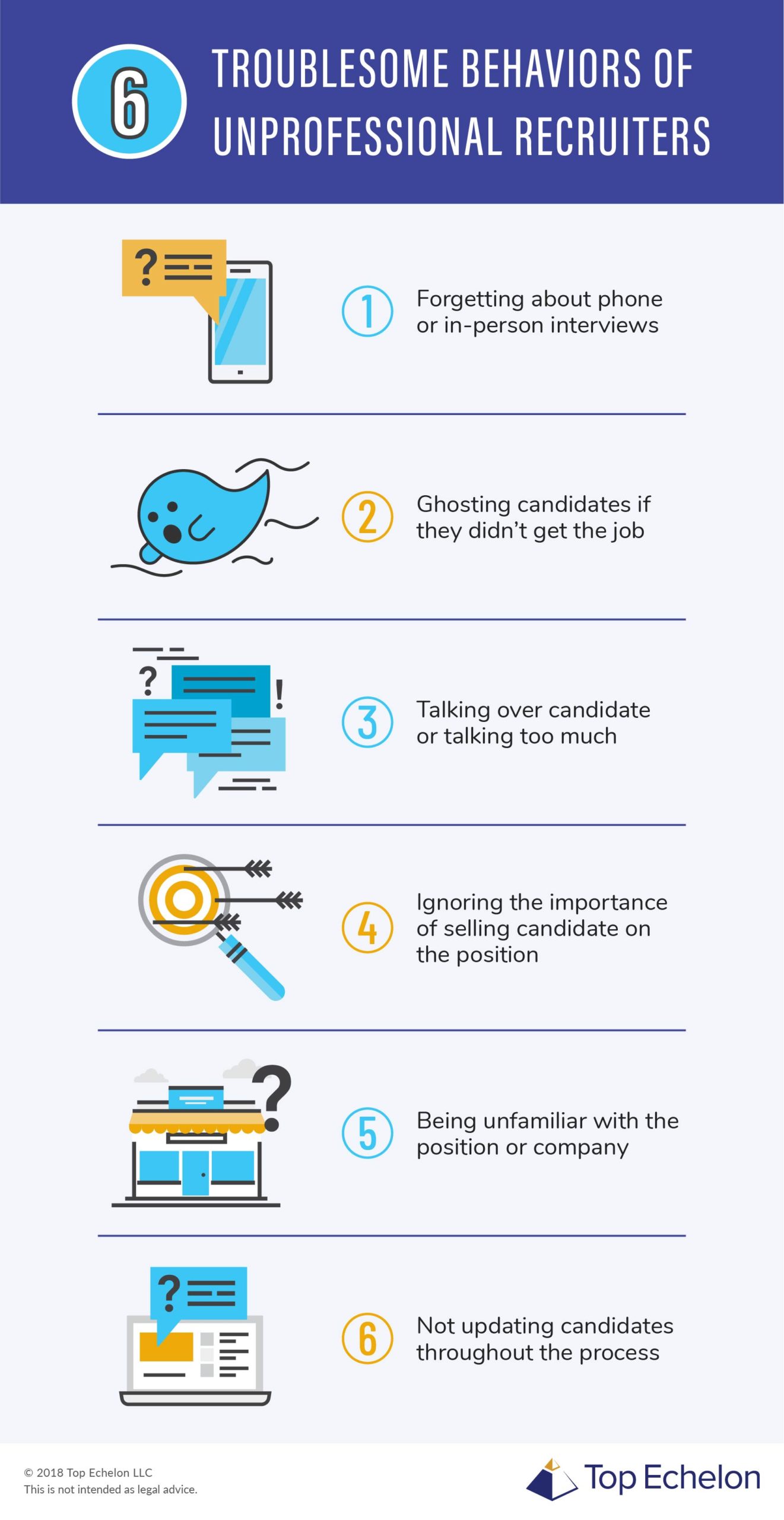As a recruiter, you are bridging the pathway between candidates seeking a job and your clients who are filling a position. When working with both parties, you must avoid exhibiting behaviors of unprofessional recruiters.
6 Behaviors of unprofessional recruiters
Professionalism is key in many industries, especially recruiting. Who wants to work with an unprofessional recruiter?
One survey found that 40% of job seekers would pull out of the recruitment process if they have a poor first encounter with the recruiter.
To keep both candidates and clients happy, you must aim for professionalism from start to finish. So, what kinds of recruiter behavior irk candidates the most?
Look out for these signs of rude recruiters.
1. Forgetting about phone or in-person interviews
A candidate shows up to their scheduled interview time, but nobody is expecting them.
Frazzled, the candidate reads through their emails to verify they’re at the right place at the right time. Ten minutes of waiting turns into 30 minutes. Someone notifies the candidate that the recruiter needs to reschedule.
Making a regular habit of forgetting about interviews can make you come across as unprofessional.
When you have dozens of candidates, forgetting about interviews is easy to do. And if you’re juggling multiple job orders, keeping track of interview dates and times may feel impossible.
To help avoid this unprofessional recruiter behavior, opt for recruiting software with the ability to schedule events, meetings, calls, and other tasks.
If you do make this recruiter mistake, take responsibility for your actions. Unprofessional recruiters often forget to apologize to candidates for the inconvenience.
2. Ghosting candidates if they didn’t get the job
Telling candidates they didn’t get a job is uncomfortable. But if you ghost candidates who don’t make the cut, candidates will likely view you as unprofessional.
When candidates don’t hear from their recruiter, they may not know where they stand in the pipeline. Some unprofessional recruiters choose to ignore candidates even after they reach out and ask about their status.
Rather than ghosting candidates who aren’t moving forward, learn how to reject a job applicant. Consider sending a job rejection email to alert candidates that they are no longer considered for the position. This lets the candidates move on with their job search. And when you are honest and upfront, candidates may want to work with you in the future.
3. Talking over the candidate or talking too much
Rude recruiters prefer to talk rather than listen. Talking too much or talking over the candidate may come across like you don’t care about what they have to say.
Screenings and interviews are a balance. You give details about the position, company, and skills required. But, listening to the candidate is arguably the most essential part of the conversation.
Candidates who feel they can’t get a word in will likely become agitated. They may feel belittled. And, talking over a candidate every time they speak is disrespectful.
4. Ignoring the importance of selling the candidate on the position
If the candidate doesn’t have the necessary qualifications, what’s the point? Although conveying the required skills is important, selling the candidate on the position is critical.
Rude recruiters act like the candidates should be leaping at the job. Candidates may feel that you don’t recognize their skills if you don’t try to sell them on the position. Top talent might feel dispensable and decide to apply elsewhere.
Not selling the candidate on the position could also lead to them turning down a job offer after accepting.
5. Being unfamiliar with the position or company
Many candidates look to recruiters as a source of information. You should know, for the most part, the ins and outs of the open position.
Unprofessional recruiters fail to do their research about the position and client’s company. As the candidate’s first impression of your client’s company, you must be knowledgeable.
You may recruit for all industries. But, you need to understand some of the terminologies for each niche to show candidates and clients you know what you’re doing. For example, brush up on IT terminology if you have an IT-related job order.
6. Not updating candidates throughout the process
According to one study, 82% of U.S. workers and job seekers want interview processes to take less than one month. You can’t completely control how long your client takes, but you can update candidates throughout the recruitment process.
Candidates don’t want to work with unprofessional recruiters who fall off the grid between each step in the process. If you don’t keep candidates posted on the position, they may opt out of the running.
Improve your contact with candidates to avoid this unprofessional recruiter trait. Give candidates approximate dates when you’ll next reach out. If your client hasn’t made a decision by this estimate, contact the candidate to let them know.
Communication and compassion are key to avoid coming across as rude or unprofessional.










